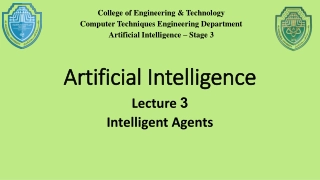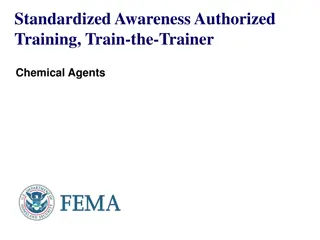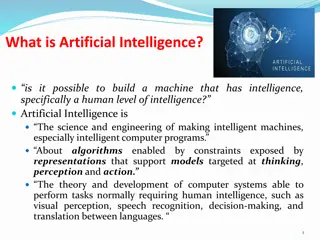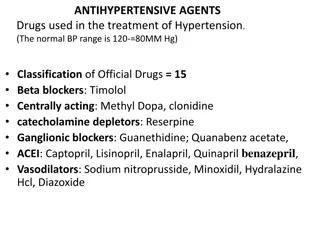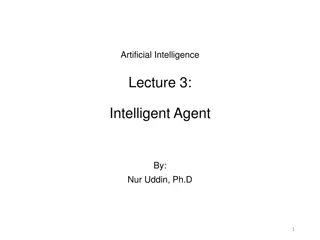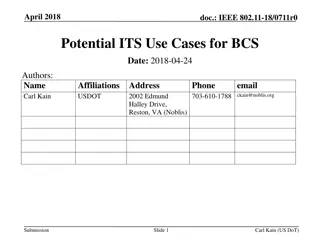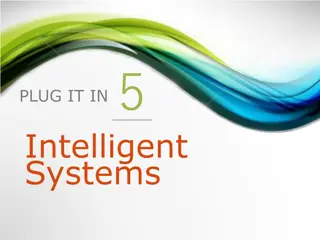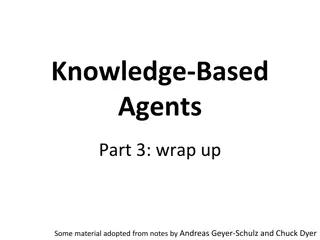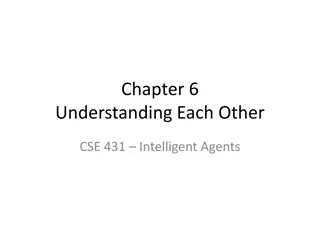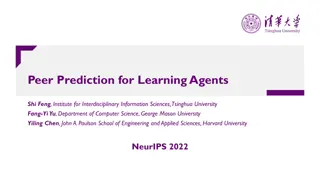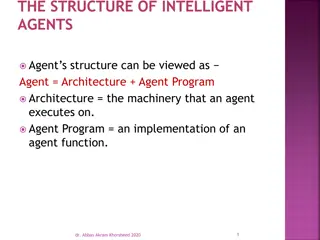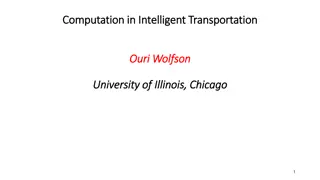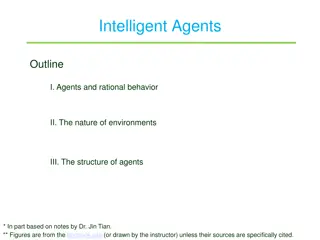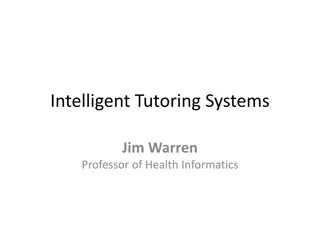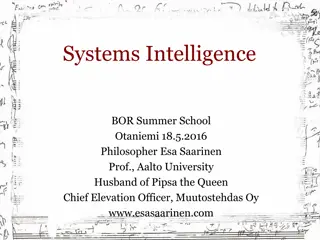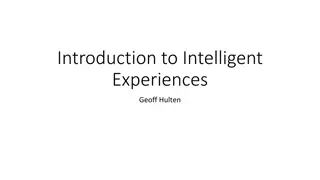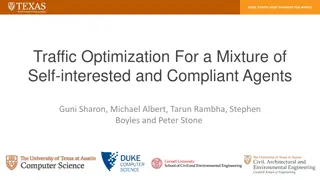Challenges in AI Agents
The common problems faced by AI agents such as lack of memory, unrealistic stories, and inability to proactively find users. Discover how to engage AI agents effectively and address major challenges like multi-modality and cost evaluation.
2 views • 18 slides
Artificial Intelligence - Intelligent Agents
Understand the task environment and performance measures in designing intelligent agents. Explore the properties of task environments in AI.
4 views • 30 slides
Jade Intelligent Automation Enablement Deck
Explore the realm of Intelligent Automation through Robotic Process Automation (RPA) and Artificial Intelligence, enabling businesses to streamline processes, enhance efficiency, and drive digital transformation. Learn about RPA's role in mimicking human behavior, the broader perspective of RPA, com
1 views • 27 slides
Understanding Adrenergic Agents in Pharmaceutical Chemistry
Adrenergic agents play a crucial role in pharmacology by influencing the sympathetic nervous system through adrenergic receptors. These agents, such as sympathomimetics and sympatholytics, impact essential functions like cardiac activity, blood vessel dilation, and insulin release. Adrenergic neurot
0 views • 120 slides
Roles and Responsibilities in Political Party Campaigning and Advertising
Roles and responsibilities in political party campaigning and advertising involve tasks such as soliciting contributions, coordinating fundraising activities, arranging financing, ensuring compliance with electoral budgets and spending limits, managing election expenses, maintaining accounting syste
2 views • 49 slides
Chemical Agents Awareness Training Overview
This training module covers standardized awareness and authorized training on chemical agents, including toxic industrial chemicals, riot control agents, and chemical warfare agents. Participants will learn about the physiological signs/symptoms, advantages/disadvantages of using chemical agents for
1 views • 20 slides
Understanding Artificial Intelligence: Building Intelligent Machines
Artificial Intelligence (AI) is the science and engineering behind creating intelligent machines that can think, perceive, and act like humans. It involves machine learning technologies, algorithms, and models that enable computers to perform tasks requiring human intelligence. AI encompasses a mult
0 views • 28 slides
Overview of Antihypertensive Agents and their Mechanisms of Action
Explore the classification of antihypertensive agents used in treating hypertension, including beta blockers, centrally acting agents, ganglionic blockers, ACE inhibitors, vasodilators, and more. Learn about the Renin-Angiotensin System, ACE inhibitors, and specific drugs like Captopril and Benazepr
0 views • 9 slides
Exploring Logical Agents and Architectures in Wumpus World
Explore the use of logical agents in the Wumpus World domain through three agent architectures: reflex agents, model-based agents, and goal-based agents. Understand how these agents operate in the challenging environment of the Wumpus World, where the task is to find the gold, return to starting pos
0 views • 21 slides
Cutting-Edge Research on Extreme Environments and Intelligent Systems at LIRA Sandpit
Explore the innovative work at LIRA Sandpit focusing on developing intelligent systems for extreme environments like the nuclear industry and space. Collaborate with experts, propose ideas, and stay updated on funding calls and research opportunities in the field. Reach out to potential collaborator
0 views • 10 slides
Understanding Film Forming Agents for Tablet Coating in Pharmaceuticals
Film forming agents play a crucial role in tablet coating, providing mechanical strength and desired film characteristics. Non-enteric film formers like HPMC, MHEC, EC, HPC, Povidone, SCMC, and PG Acrylate Polymers are commonly used for uniform film formation. Each agent has unique properties and pr
1 views • 10 slides
Selection and Appointment of Foreign Sales Agents: A Comprehensive Guide
Learn about the process of selecting and appointing foreign sales agents in international marketing, including the meaning of agency, content of foreign sales agency contracts, reasons for appointing agents, factors influencing agent selection, as well as the advantages and disadvantages of working
1 views • 12 slides
Understanding Intelligent Agents in Artificial Intelligence
Intelligent agents in artificial intelligence act rationally to achieve the best outcomes in various environments. They operate autonomously, perceive their surroundings, adapt to changes, and pursue goals efficiently. Developing intelligent agents involves examining agents, environments, and their
1 views • 22 slides
Understanding Antineoplastic Agents in Pharmaceutical Chemistry
Antineoplastic agents, such as alkylating agents, target DNA or DNA replication to induce apoptosis in cancer cells. Alkylation of DNA can lead to cell death through various mechanisms, including p53 activation. Resistance to alkylating agents can develop in cancer cells. The process involves nucleo
1 views • 94 slides
Understanding Foliar Nutrition: Droplet Size and Wetting Agents
Foliar nutrition focuses on the effective entry of nutrients into plants through foliar applications. Key factors include droplet size for optimal absorption, the role of wetting agents in nutrient entry, and the importance of fertilizer materials with high solubility and purity. Smaller droplets en
0 views • 8 slides
Understanding Adjuvants and Herbicide Formulation
Adjuvants are additives that enhance herbicide effectiveness, crucial for optimal weed control. Types include surfactants, stabilizing agents, coupling agents, humectants, deposit builders, and more. Surfactants aid in wetting and spreading herbicides, stabilizing agents keep suspensions intact, cou
0 views • 10 slides
Understanding Azole Antifungal Agents for Veterinary Use
Azole antifungal agents play a crucial role in treating fungal infections in veterinary medicine. Imidazoles like clotrimazole and triazoles like fluconazole are commonly used for their fungistatic properties. These agents inhibit fungal enzymes, disrupting membrane fluidity and inhibiting cell repl
0 views • 14 slides
Important Changes for Marketplace Agents in the 2024 Final Rule
The 2024 Marketplace Final Rule brings significant changes affecting Marketplace agents. Agents must document consumer consent and confirmation of application details. Also, a longer HHS review period for agent rebuttals is introduced. Navigators and other assisters now have the option to enroll con
2 views • 8 slides
Understanding the Impact of the Tenants Fee Ban on Landlords and Agents
The Tenants Fees Act bans all fees from letting agents and landlords to tenants, impacting the rental market significantly. This article explores what can be charged to tenants, reasons for using an agent, services provided by agents, and insights from landlords on the changing landscape post-ban. A
0 views • 13 slides
Understanding Agency Relationships in Business
Agency relationships in business involve principals appointing agents to act on their behalf. There are different types of agents, such as general agents, special agents, factors, brokers, del credere agents, confirming houses, and commercial agents. Each type of agent has specific roles and respons
0 views • 18 slides
Understanding Intelligent Agents in Chapter 2
This chapter delves into the concept of agents and environments in the realm of intelligent systems. It explores the types of agents, their functions, and interactions with environments. Rationality, performance measures, and the essence of being a rational agent are key aspects discussed. The vacuu
0 views • 28 slides
2013 Membership Development Award: Young Agents Committee Success Story
The Young Agents Committee of the Independent Insurance Agents of Georgia, Inc., won the 2013 Membership Development Award for their outstanding recruitment and retention efforts. Their theme focused on perpetuation, increasing active membership by 36%. Through grassroots development, live registrat
0 views • 10 slides
Potential Intelligent Transportation System Use Cases for Broadcast Services Study Group
This presentation highlights potential Intelligent Transportation System use cases for consideration by the Broadcast Services Study Group. The use cases were derived from the Architecture Reference for Cooperative and Intelligent Transportation (ARC-IT). While not exhaustive, the presentation provi
1 views • 19 slides
Exploring Intelligent Systems: AI, Expert Systems, and More
Delve into the realm of intelligent systems with topics ranging from artificial intelligence and expert systems to neural networks, fuzzy logic, genetic algorithms, and intelligent agents. Discover the value, limitations, and applications of these technologies through real-world examples and use cas
0 views • 35 slides
Understanding Leavening Agents in Baking
This content delves into the importance of leavening agents in baked goods, discussing natural leavening agents, the chemical processes of baking soda and baking powder, the role of yeast leavening, and the differences between quick breads and other baked products. It also covers the leavening agent
0 views • 9 slides
Understanding Knowledge-Based Agents: Inference, Soundness, and Completeness
Inference, soundness, and completeness are crucial concepts in knowledge-based agents. First-order logic allows for expressive statements and has sound and complete inference procedures. Soundness ensures derived sentences are true, while completeness guarantees all entailed sentences are derived. A
0 views • 6 slides
Understanding Agents in OPM Workshop by Luc Moreau
Delve into the concept of agents in OPM Workshop facilitated by Luc Moreau. Explore the nature of agents, their differences from artifacts, causes of their behavior, and challenges in their utilization. Discover the role of enactors, executables, and workflows in generating and controlling agents. U
0 views • 5 slides
Understanding Gastrointestinal Agents: Acidifying Agents, Antacids, Saline Cathartics
Gastrointestinal agents such as acidifying agents, antacids, and saline cathartics are used to manage gastrointestinal disturbances. Acidifying agents like Hydrochloric Acid aid in gastric digestion, while antacids help reduce gastric acidity. Saline cathartics are used as laxatives. Achlorhydria, a
0 views • 36 slides
Understanding Intelligent Agents and Semantic Networks in Computing
Explore the world of intelligent agents, XML, RDF, OWL, ontologies, and class constructors in computing. Delve into how these technologies enable machines to understand, communicate, and process data efficiently.
0 views • 23 slides
Understanding Peer Prediction Mechanisms in Learning Agents
Peer prediction mechanisms play a crucial role in soliciting high-quality information from human agents. This study explores the importance of peer prediction, the mechanisms involved in incentivizing truthful reporting, and the convergence of learning agents to truthful strategies. The Correlated A
0 views • 7 slides
Overview of Intelligent Agents: Structures and Types
The structure of intelligent agents consists of architecture and agent program. Different types of intelligent agents include simple reflex agents, model-based reflex agents, goal-based agents, and utility-based agents. Each type operates based on specific characteristics and methods to make decisio
0 views • 19 slides
Innovations in Intelligent Transportation Systems and Applications
In this informative content, various aspects of Intelligent Transportation Systems (ITS) are discussed, including safety applications to make drivers aware of unseen hazards, efficiency/convenience/mobility applications for on-route traffic and weather conditions, environmental/energy applications s
0 views • 75 slides
Recent Achievements in Intelligent Transport Systems Communication Standards
Recent achievements in Intelligent Transport Systems communication standards include the establishment of new focus groups, such as FG-AI4AD and FG-VM, to drive standardization activities for AI in autonomous driving and vehicular multimedia. These groups aim to improve safety, performance, and publ
0 views • 10 slides
Understanding Intelligent Agents: Key Concepts and Rational Behavior
Intelligent agents operate based on perceptions, reasoning, and actions within various environments. Agents function through a sequence of percepts, utilizing programs to interpret their architecture. The Vacuum-Cleaner World serves as an illustrative environment for agent behavior, highlighting the
0 views • 31 slides
Intelligent Tutoring Systems: Enhancing Learning through Technology
Explore the world of Intelligent Tutoring Systems (ITS) with Jim Warren, a Professor of Health Informatics. Learn about the dimensions of ITS, examples like AutoTutor and LISP tutor, and implications for the future of learning and MOOCs. Delve into student modeling basics, methods to acquire/update
0 views • 22 slides
Understanding Alkylating Agents in Oncology: Mechanisms and Pharmacokinetics
Alkylating agents have a long history as anti-cancer drugs, with Mechlorethamine being the first developed in 1942. They react with cells in all phases of the cell cycle, causing DNA alkylation and cross-link formation. Common alkylating agents include Cyclophosphamide, Melphalan, and Temozolomide.
0 views • 75 slides
Systems Intelligence: Enhancing Intelligent Behavior in Complex Systems
Explore the concept of Systems Intelligence, focusing on intelligent behavior within complex systems through interaction and feedback. This approach emphasizes understanding the interdependency of individuals within a larger system, enabling intelligent actions and decision-making. Delve into practi
0 views • 21 slides
Challenges and Goals of Intelligent Experiences in UX Design
Understanding the concept of intelligent experiences as highlighted by Geoff Hulten, this content delves into the goals, examples, and complexities associated with implementing intelligent interactions in various scenarios. It explores how intelligent systems can achieve objectives, change user beha
0 views • 16 slides
Traffic Optimization for Self-interested and Compliant Agents
In this study, Guni Sharon, Michael Albert, Tarun Rambha, Stephen Boyles, and Peter Stone explore traffic optimization for a mixture of self-interested and compliant agents. The research delves into routing flows of agents across networks and analyzes equilibrium scenarios. The motivation behind the
0 views • 20 slides
Understanding Antimicrobial Agents and Their Mechanisms of Action
Antimicrobial agents play a crucial role in combating harmful microorganisms. They encompass various categories such as antiseptics, disinfectants, germicides, and bacteriostatic agents. Each category targets different types of microbes and serves specific purposes in maintaining public health stand
0 views • 40 slides

